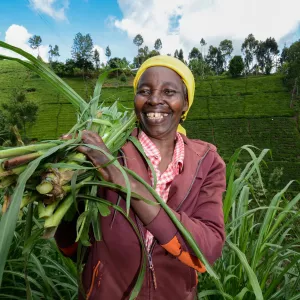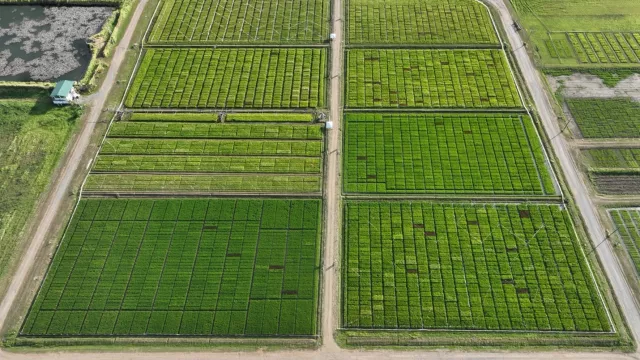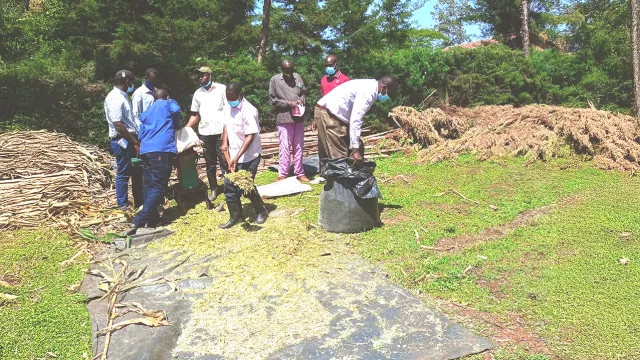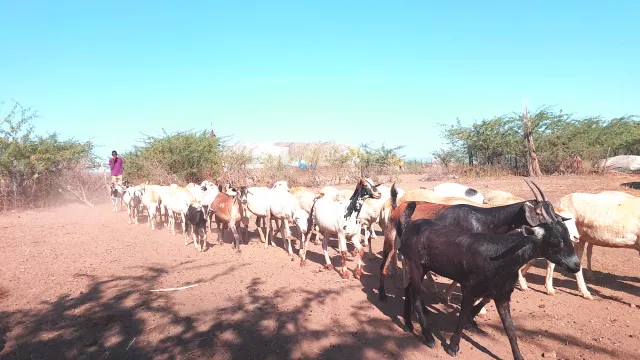East and Southern Africa

About
CGIAR’s East and Southern Africa (ESA) region encompasses 19 countries from South Africa to Ethiopia. ESA is a culturally, geographically, and economically diverse region home to some of the world’s fastest-growing economies, and some of the most fragile. CGIAR Centers have a long and successful partnerships with regional and national agricultural research institutes since the 1970s, and continue to hold deep relationships with government agencies, civil society, farmer organizations, and the private sector. Collaborative efforts have contributed immensely to enhancing food and nutrition security in the ESA region.
The ESA region has the greatest number of projects, initiatives, and funding within the CGIAR portfolio. CGIAR Centers are home to world-class science facilities that are not found elsewhere in Africa, offering a source of training and capacity development for young African scientists to ensure science stays in Africa. These facilities include the only environmental lab testing greenhouse gas emissions of livestock in Africa, bio-secure facilities carrying out research on zoonotic disease, and genebanks for forages, rice, potatoes, and other key products. There is also a 13,000-hectare ranch that carries out research on livestock, wildlife ecosystems, climate change, and zoonotic disease.
Our collaborative work in the ESA region contributes to a vision for land, water, and energy to be sustainably managed to ensure food security for the most vulnerable, enable adaptation to climate stress, and contribute to economic growth.
Work in this region is further coordinated by the Regional Director for Continental Africa.
Challenges and Opportunities
- Food systems challenges in ESA are complex, with high levels of vulnerability, malnutrition, and food insecurity in the region. Though it is home to only 25% of Africa’s total population, the region accounts for more than 50% of the continent’s chronically undernourished people.
- The region suffers from a lack of diversity in diets, and obstacles for the most vulnerable to access healthy and nutritious food.
- It also faces a geographic patchwork of climate challenges, most commonly shorter and more unreliable growing seasons, particularly in the more arid south.
- Agriculture has great potential as a driver of economic growth in the ESA region, which is home to some of the fastest growing economies in Africa, and has the potential to feed much of Africa.
Research and Action
- Deliver scalable and investment-worthy, climate-smart sustainable intensification solutions.
- Collaborate on integrated economic, production, food safety, and nutrition enhancing interventions.
- Enhance vision-led intersectoral capacity strengthening, coordination, and policy coherence.
- Support multi-stakeholder coordination, blended finance, and empowerment of women and youth.
Partners
Partnerships will be essential to address the complex challenges facing the ESA region. CGIAR Centers have held a diverse range of partnerships with the African Union and its associated departments, governments, civil society organizations, donor agencies, farmer organizations, private sector actors, regional and sub-regional agricultural research organizations, and national agricultural research institutes since the 1970s. The ESA region will continue to leverage this strong foundation, working closely with the Forum for Agricultural Research in Africa (FARA), the Association for Strengthening Agricultural Research in Eastern and Central Africa (ASARECA), the Centre for Coordination of Agricultural Research and Development for Southern Africa (CCARDESA), and the African Forum for Agricultural Advisory Services (AFAAS), while building new innovative partnerships with the private sector, new financial institutions, and local African start-ups, to ensure research and innovation delivers impact at scale.
News
-

Plant breeding is a critical tool in the fight against climate change
Fighting climate change requires a comprehensive strategy that spans energy, transport, and, crucially, food and agriculture. Halting deforestation...
-

How citizen science is transforming pastoral resilience
In northern Kenya, KAZNET - a CGIAR digital platform - is empowering herders to collect, share, and act on real-time data about rangelands, markets,...
-

Bridging silage quality gap: A study with smallholder dairy farmers
Silage is vital for Kenya’s smallholder dairy farmers, yet poor quality limits productivity. A CGIAR / ILRI demand-driven study in Nandi and Bomet...
-

Hidden in Plain Sight: Pastoralist ‘pioneers’ redefining resilience
Pastoralist communities in Ethiopia are redefining climate resilience through locally developed practices in animal health, grazing, and forage...
Publications
-
Progress Report Ethiopias Partnership for Accelerating Agricultural Solutions Scaling PAASS
-
Seasonal variation in mosquito abundance and environmental predictors in semipastoral southern Kenya implications for endemic Rift Valley fever
Background: Ecological variables that vary across time and space shape mosquito populations, creating microenvironments that can become disease...
-
Impact of invasive weed Parthenium hysterophorus Asteraceae on mosquito abundance and plantfeeding behavior in an arboviral endemic region in Kenya
Background: Invasive alien species (IAS) are rapidly altering ecosystems, undermining biodiversity, ecosystem processes, and interspecies...
-
Knowledge attitudes and practices of women related to human and animal feces management in Ethiopia Evidence for strengthening water sanitation and hygiene WaSH initiatives
Background: Water, sanitation, and hygiene (WaSH) programs aim to prevent feco-oral disease transmission, but their effectiveness in low- and...

